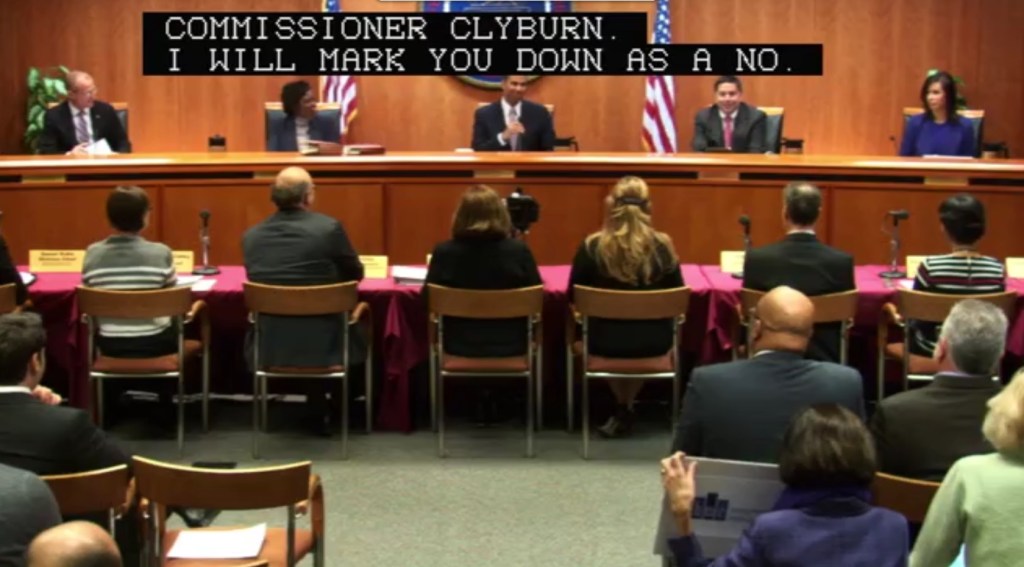FCC Commissioner Clyburn guts guts anti-net neutrality order in extended dissent

FCC Commissioner Clyburn’s passionate dissent at last month’s meeting left no room for guesswork on her position on the Commission’s plan to eliminate net neutrality. But it wasn’t all she had to say. Yesterday, released alongside the final text of the “Restoring Internet Freedom” order, is an extended statement that goes into further detail and strikes at the new rule’s numerous inadequacies.
The whole statement is a whopping 6,000 words, and well worth reading in its entirety — especially if you missed her delivery of it on the day. Perhaps half its length is dedicated to the new, more technical exposition of the rule’s flaws.
Here are a few highlights I found in my read-through.
Regarding the lack of evidence supporting the idea that net neutrality has held back innovation:
We have seen self-serving statements from broadband providers that our net neutrality rules have somehow hamstrung them from bringing “innovative” new offerings to market before. They never did tell us what those offerings would have been at any real level of detail.
My view is that if there indeed were innovative offerings that would have garnered any real consumer interest, the better course would have been to make those ideas public, and let consumers badger the contrarian FCC into submission. But, since no detailed plans of these other phantom offerings that were allegedly foreclosed by our rules were made public, my sense is that those offerings were as real as rainbow-maned unicorns.
I’ve asked several broadband providers specifically about these “phantom offerings” and have gotten no replies.
Regarding the argument that net neutrality led to a decline in investment:
Nothing in this item convinces me that investment has dropped as a result of our net neutrality policies… To suggest that net neutrality rules shifted billions of dollars in capital beggars the imagination, and the record offers no proof that investment trends match the regulatory landscape.
If you believe the information submitted by broadband providers in the record, that information tracks the Fed’s assessment of investment in the broader economy. This suggests that any alleged decrease in investment by broadband providers could be due to macroeconomic factors that influenced the overall economy, rather than the 2015 Open Internet rules.
At best the jury is out on this claim, and companies themselves have stated on the record that net neutrality rules were not a factor in their investment plans. (I’ve asked about these statements too, to no avail.)
On the history of Title I and II:
The FCC majority is being disingenuous in its retelling of regulatory history, particularly as it relates to internet and packet-switched services. This majority is not “returning” to a time where packet-switched networking, and the internet access variant, in particular, were regulated as Title I services… painting the FCC’s past approach to internet access as a deregulatory nirvana fails to grapple with the truth of our regulatory past.
There is not a single modern service that the majority would characterize as a telecommunications [i.e. a Title II] service, effectively reading that definition out of the statute. Hundreds of computer scientists who filed in the record agree that this reclassification is nonsensical and does not match up with the underlying internet technology. This can easily be lost in the regulatory gobbledygook that I will let the lawyers deal with, but I think it is illuminating to make a few points about this.
I believe this exposes this as an outcome-oriented decision, devoid of any reasonable mooring in technology or consumer expectations.
The first bit you can learn about in my history of net neutrality, and the second bit in the many explanations of why the current order is technically incorrect in its definition of how the internet works.
Regarding the FCC declining to pursue net neutrality rules for mobile broadband:
Although the majority concedes that the Commission has authority to impose open internet conduct rules on mobile broadband service licensees, it declines to do so because of its view that this would lead to imposing regulatory burdens on mobile licensees that are not placed on fixed broadband services. I do not see how the majority can properly reach that conclusion until it has reviewed the more than 47,000 complaints that the National Hispanic Media Coalition’s (NHMC) FOIA request revealed. This is another reason why the Commission should have delayed its vote on this item.
Indeed, this late-breaking revelation that tens of thousands of complaints were left unaddressed is one of several black marks on the proceedings, and likely will figure in legal challenges.
Regarding the idea that the FTC will pick up where the FCC left off:
Recall that the FTC must act after harm has already occurred, and must do so through litigation. This means no clear rules of the road for broadband, and that a startup or sole proprietor will likely be long gone before its complaint is adjudicated.
Courts may deny the FTC’s efforts to impose antitrust remedies on broadband providers because the industry is ostensibly regulated by the FCC. Indeed, Verizon v. Trinko contains language that suggests that where there is an ostensible remedy for harm under the Communications Act, the courts will not go out of their way to find an antitrust violation. So, the very fact that the FCC disclaims authority might also undermine the FTC’s authority as well.
The legal precedents here are complex, but essentially the FTC may be barred from applying antitrust law — which the new order constantly refers to as a remedy — because an expert agency is already on the beat. If the FCC won’t, and the FTC can’t, who will? No one, that’s who.
And lastly, as a last flourish to the Commissioner’s extended statement:
In short, we are trading in clear protections for uncertain ones, rock-solid legal authority for a shaky one, and robust enforcement authority for a weaker one…My fear is that this is yet another ploy to roll out the red carpet for broadband providers, while putting consumers in the long queue for the side door. Welcome to a regulatory-free zone.
Curious what happens next in the battle for net neutrality? You keep fighting.
Featured Image: MANDEL NGAN/Getty Images

